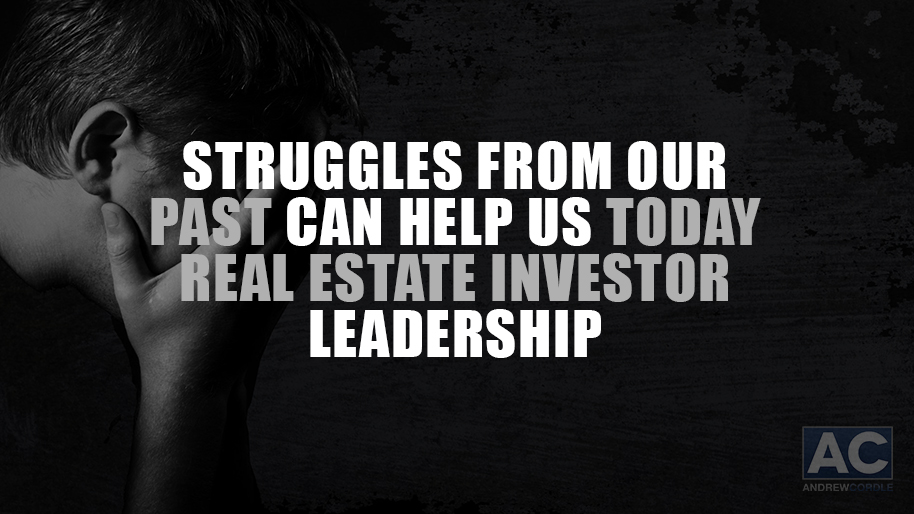
Leadership in real estate and for investors is paramount. Often, when flipping houses or learning how to make money in real estate one finds themselves in the middle of a struggle. One must learn to use the lessons of struggle in our past and apply it to our business today. Learning from past struggles will help every investor be a better leader and make more money flipping houses! Mark Morey operates a survival training school called Vermont Wilderness Survival School in Brattleboro, Vermont. His focus is teaching children ancient native skills of survival. Author Laurence Gonzales writes, “Morey is one of the few people I’ve ever met who would survive being dropped naked into the woods”. Morey makes an interesting observation about children. “Inner-city children did better in survival training than ones from the suburbs, because the suburban children have no predators“. Inner-city kids learn the secret routes, the shortcuts that keep them safe from the tough crowd. Our challenges in life are often bigger than we are, but if we buckle and run from every large problem, we’ll be running the rest of our lives. Sometimes you gotta man-up and face the challenge. Survival doesn’t depend on the size of your resources; it depends on the size of your heart! Too often, a mature adult finds himself in either a treacherous divorce that reduces him to zero assets or in a financial loss that burdens him with a mountain of debt. Maybe some may find themselves imprisoned as a fall guy for the “untouchable bosses” who deflected their wrong doing. Or even as a convicted criminal for a genuine mistake in judgment. Unfortunately, survival is not well-taught in our homes and schools. We have grown up soft, spoiled and with the feelings of entitlement. We consider ourselves to be “roughing it” if the television doesn’t operate properly during the big game. If our air conditioning unit fails on a hot humid night. Even if our power goes out for more than a few hours from a major storm. We have not been well-schooled in the practice of surviving or of enduring hardship. Regardless of how technologically advanced we become or how secure and safe we feel with insurance and home alarms, we have yet to find a way to avoid the emotional jungles of loss, death, pain, and rejection. GPS, compasses, MRE’s (meals ready to eat), modern clothing and footwear. All are super to have outdoors. Yet what does one do when the back pack with all the techno-gizmos and food falls over the ledge. If it’s carried away downstream when the canoe overturns? We don’t call them accidents for nothing. They are not planned, they just happen. The hand loses its grip or the foot slips on a ledge. Marriages implode, markets collapse, the housing industry plummets and your loan is called by...
Read More »

On Sunday, January 18, 2014, we witnessed one of the most powerful forces in the universe: Belief! The Seattle Seahawks proved to the world how important it is to believe in your self, to be confident in your abilities, and to be convinced of a result nothing short of a win. They NEVER gave up despite the fact that the entire deck was stacked against them. It got so bad that with 3 minutes and 7 seconds left in the game, the Seahawks probability of a win was a paltry .10%! Yes, that’s 1/10 of 1%! But they persevered until the glorious end. Their fearless young leader, Russell Wilson, had ice running through his veins that night. He had thrown 4 interceptions already that day to an under-rated, un-drafted free agent receiver named Jermaine Kearse. But that did not shake his belief, his conviction, or his determination. He told the offensive coordinator that they’re gonna win that game and he’s gonna do it by throwing a touchdown to Kearse. As the game drifted into over-time, Wilson marched the offense straight down the field and in the final seconds, pitched a 35 yard perfectly thrown touchdown pass to win the NFC Championship for the second season in a row. While I’ve never played in the NFL, I can relate to the trials of defeat, or likely defeat, and then triumph against the odds. In a matter of months, the Great Recession took me from a million-dollar lifestyle to sleeping in my parent’s basement. Instead of throwing in the towel, like the Seahawks, I took the lessons that I learned at the end of the last real estate bubble and completely restructured both my personal life and my business investing strategies. But this was not just a story of success and failure; it is a story of triumph against the odds with a personal touch. I never gave up, I believed in myself and my abilities. Also, I trusted my Team members and co-workers. I lived by conviction and I refused to stay knocked down, and I won! “A business that makes nothing but money is a poor business.” -Henry Ford Click To Tweet Last year, I was another victim of the charlatan publisher, Andrew J. Waite. I’ll defer from mincing words here. The guy outright extorted me to advertise in his magazine! I spent literally ten’s of thousands of dollars attempting to keep this man at bay. He would constantly send me veiled threats that he could and would destroy my company and reputation in the real estate industry. However, his feeble attempts to destroy me have failed. I never gave up fighting for my company, for my reputation and for my family. I stayed determined and I stayed convicted. Additionally, I believed that the truth would prevail and it has! My point in sharing these...
Read More »

As a real estate investor your success depends on your habits. Positive habits breed positive results. From the beginning of your real estate investor career to the day you retire, following a set of best practices will keep your business successful. In this post I want to cover eight real estate investor habits and best practices that you need to have! Form a Plan A solid business plan is the first thing needed to get your real estate investor career off the ground. In order to know where you’re going, you need to have a map. Take the time to write out what you want to accomplish and the steps you need to take to get there. Always having a well thought out business plan will keep you on track and keep your real estate investor career successful. Know Your Market There is nothing more important to a real estate investor than knowing your market. You always need to understand who you are buying and selling to. You also need to understand the economy in which you are working on. Whether you operate in one city or multiple locations, always stay on top of what the local economy is doing. You may be getting results in a city with one business plan that will not work in a different city. Master Your Target Market As part of your business plan, figure out what market you want to attack. Whether it is probates, motivated sellers or foreclosures, figure out what market you want to target and do what it takes to master it. Every real estate investor wants to be the master of their craft. Take the time to master one particular skill or approach before attempting a different strategy. If you try to learn every real estate strategy at once, you’ll end up doing a lot of things halfway and putting way more stress on yourself than you need. Promote a Referral Program A referral program is a great way to have deals come to you. You, as a real estate investor, should always be looking for new ways to generate leads. Your time is valuable. Offering a referral program is a great way to take a load off of your back and get motivated sellers to call you. Offer a reward to contacts that you meet either verbally or on a referral card. Tell them to keep your eyes peeled for houses that fit your investment criteria. Having eyes all throughout the city or cities that you work can provide you with extra time to take advantage of other marketing strategies and opportunities. Stay Educated You have to stay ahead of the game. Always stick to your business plan and to the strategies that get you results. That being said, make time to learn and test out different marketing methods and ways to...
Read More »

Thirty-five year old George Cowan, a Civil War veteran who had moved to Helena, Montana, to prospect for gold and to work as a lawyer, was thinking of some way to console his wife Emma, who had just lost their first child. Emma was 24 years old. Five years earlier, Yellowstone National Park had been officially dedicated and opened to the public for tourism. Wondering if it would be safe to take his young wife there for some camping and fishing, George spoke to an army scout from the area who said, “You will be as safe in the park as in New York City.” On August 5, 1877, George and Emma, accompanied by Emma’s brother Frank, her sister Ida and 6 other men, left their home for Yellowstone. Nine days later, the group was in their camp in Yellowstone preparing to go fishing only to find themselves surrounded by Indians from the Nez Perce tribe. The Nez Perce had been living in the Wallowa Valley area of Washington State. They had felt forced to leave by encroaching cattlemen. They felt a new home with the Crow Indians of Eastern Montana would be more accommodating. That or they could migrate to Canada to join the Sioux Indians there. The federal government ordered them to stay in Wallowa temporarily until a better arrangement could be negotiated, but the Nez Perce decided to strike out east on their own. Attempting to prevent their movement, a drunken band of soldiers fell upon a smaller group of the Nez Perce and killed nearly 100 of them, mostly woman and children. Now the Nez Perce felt the bitterness and heavy hand of the federal government and decided to covertly move to Canada and escape. They were passing through Yellowstone on their journey when they met the tourists of George Cowan’s party. On their two-year anniversary, George and Emma found themselves in the middle of the last great frontier Indian battle of the USA. Emma heard Indians outside of their tent. George, fearing that some bandits may be attempting to steal their provisions, grabbed his shotgun and headed out to meet the intruders. The Indians were indeed trying to talk some of Cowan’s party out of provisions, but George insisted no one would take them without a fight. George’s legal training along with his stubbornness caused him to argue with the Indians who were well-armed and in superior numbers. Years later, George confessed to his daughter Ethel that perhaps his well-known bluntness might have escalated the situation. His great-granddaughter said, “I think my great-grandfather realized he could’ve handled it a little more diplomatically. It’s one of those incidents where hot-headedness prevailed both with the young Indians and my great-grandfather.” The Indians began to escort the Cowan party to their chiefs at the main camp. The chiefs wished to free them but...
Read More »











